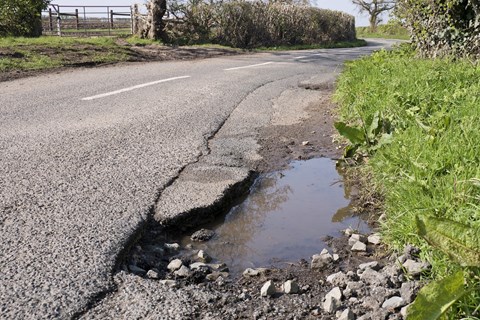► Drivers increasingly concerned by potholes
► Damage claims soaring after wet summer
► 42,675 miles of road are in poor condition
Car breakdowns caused by potholes on Britain’s roads have soared by a fifth this summer after one of the wettest Julys on record.
The soggy summer has caused further damage to the country’s crumbling road surfaces and the AA breakdown service said call-outs from pothole damage rose by 20% in July compared with the same month a year earlier.
Typical damage included bent wheels and broken suspension parts after cars hit potholes submerged in standing water. In total, the AA reported 50,079 call-outs to pothole damage last month. Year to date, that total swells to 362,172 incidents caused by pockmarked roads.
‘With 2023 looking to be one of the worst years on record for pothole damage, we need to see more investment in local roads maintenance funding,’ said Jack Cousens, head of roads policy at the AA, who called for more funding to repair roads before icy conditions in winter compound the problem.
Funding to fix Britain’s pothole problem
The government increased its Potholes Fund by £200 million to £709m in the 2023 Budget, but many councils appear to deprioritising fixes. And even that increase is probably a drop in the ocean considering the scale of the problem.

Rick Green, chair of the Asphalt Industry Alliance, said it would take £14.02 billion to tackle the backlog of potholes blighting UK roads, the highest recorded in 28 years. ‘The link between continued underinvestment and the ongoing structural decline and below-par surface conditions of our local roads is clear.’
What to do if your car is damaged by a pothole
Motoring groups recommend two approaches to recording pothole damage:
- Preventative action If at all possible, report local potholes using the government’s reporting mechanism which will direct you to the relevant authority. If the defect is on a motorway or A-road, you might have to report to Highways England (email info@highwaysengland.co.uk or telephone 0300 123 5000)
- Remedial action If your car is damaged, gather evidence to prove how it happened. Make a note of exact time and location, plus be sure to take photographs of the car and the pothole, using a ruler or measuring tape to show the depth and diameter of the crater
How to claim for pothole damage
It is not always straightforward to make a claim for pothole damage, but according to consumer champions at Money Saving Expert UK councils paid out £23m in compensation in 2022.
It can be difficult to prove that a local authority is liable, but if you can prove your council was made aware of the road defect using the reporting tool, your claim will likely stand a better chance. Typically, a pothole needs to be deeper than 4cm to count as a risk and you should measure the hole and photograph it if safe to do so.
Register your claim here on Gov.uk website.
Make sure your claim contains the precise location of the pothole, explaining why it was dangerous and noting how and when the damage took place. It is important that you can prove the damage was done by the pothole, and not just by regular wear-and-tear, say. A written repair quote showing the cost will provide proof of costs.
Do councils have to pay compensation?
Section 58 of the Highways Act 1980 says that the local authority must be made aware of a pothole for it to be bale to fix it. This is a reasonable request – councils can hardly mend holes they don’t know about: ‘This requires that a court shall have regard to whether the highway authority knew or could reasonably be expected to know, that the condition of the part of the highway to which the action relates was likely to cause danger to users of the highway.’
It’s why reporting potholes is so important. If this approach fails, you can try your insurance company instead.
Pop star Sir Rod Stewart took matters into his own hands in 2022 when he repaired a pothole outside his home himself, complaining that his local council refused to fix it. Essex County Council warned that anyone attempting this could become liable for accidents on that stretch of road.